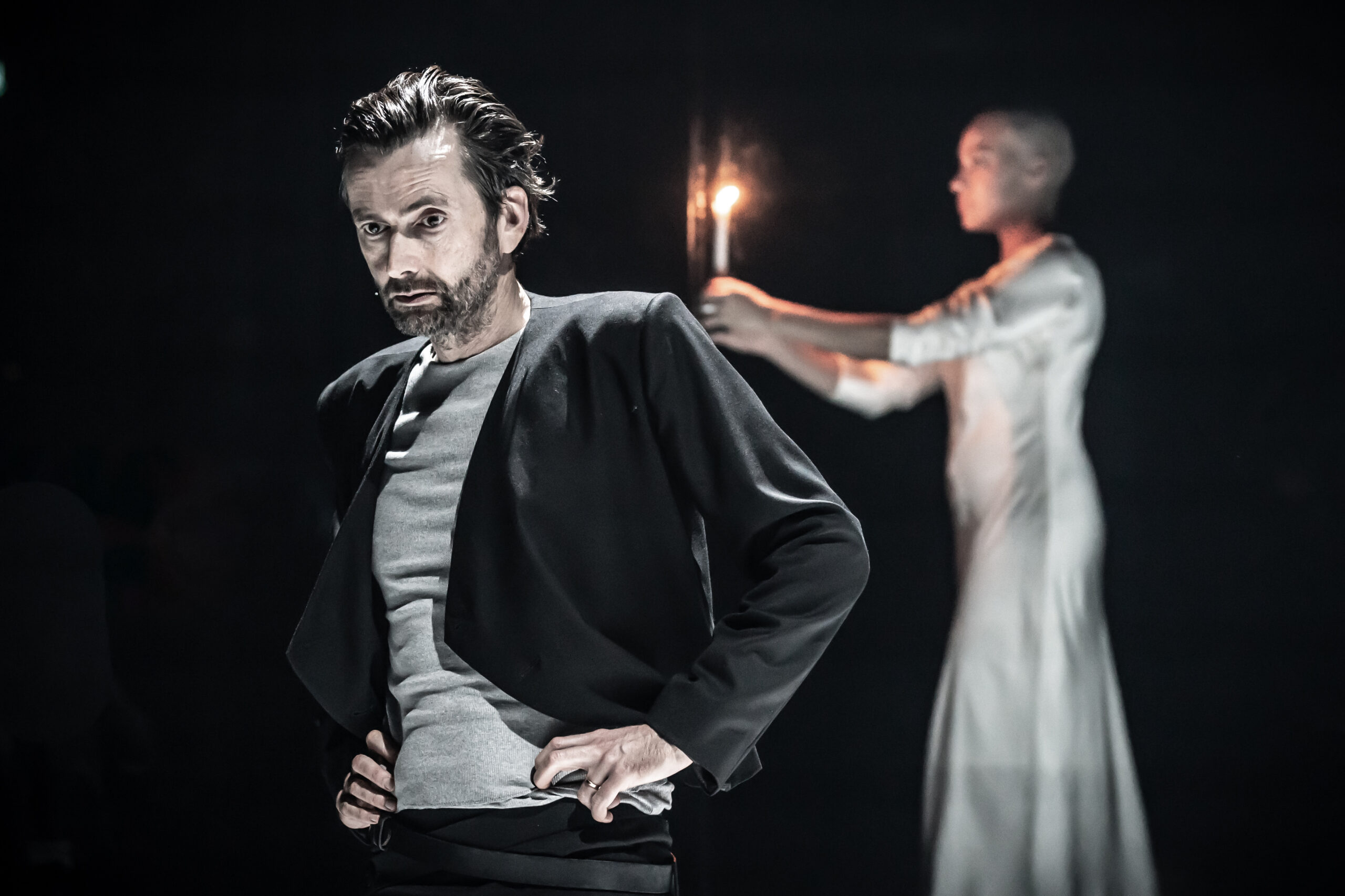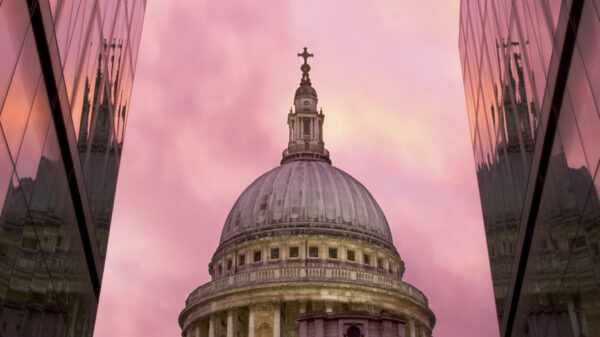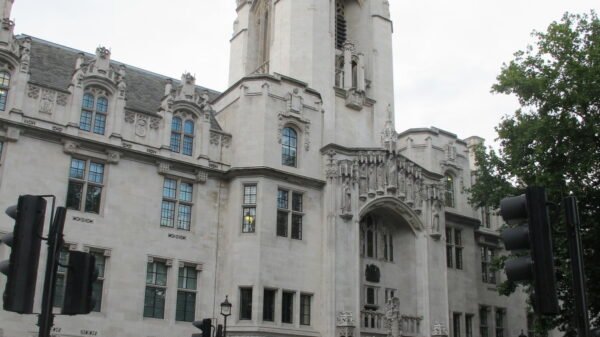Staff Writer Mohana Mitra examines how Max Webster puts language center-stage in his contemporary production of ‘Macbeth’, starring David Tennant.
Max Webster’s (Life of Pi, Much Ado about Nothing) production of ‘Macbeth’ simplifies the beloved routines of the centuries-old play, and brings a contemporary feeling to the classic Shakespearean tragedy. The efforts taken to bring the centuries-old play into the cultural consciousness of a younger audience, all while maintaining the essence of cruelty and grand ambition, comes across marvelously and must be applauded. This is especially potent considering the clever casting of David Tennant—a favorite, especially among Gen Z!
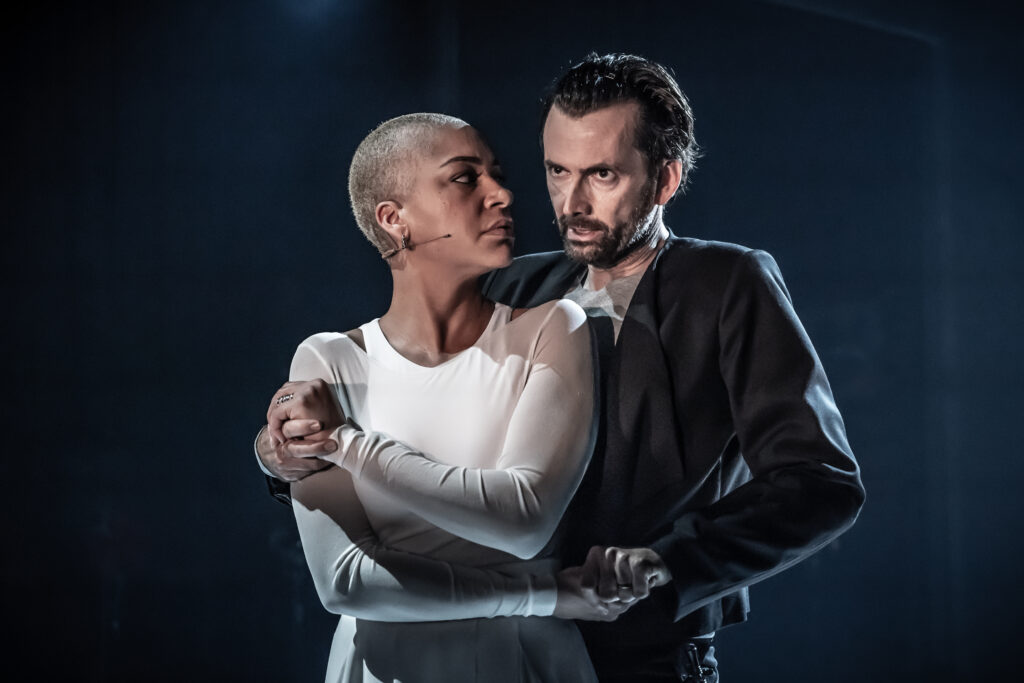
Webster’s stripped-back production interprets ‘Macbeth’ as primarily an exploration of the human psyche. David Tennant (Rivals, Good Omens) as the murderous King of Scotland and Cush Jumbo (The Good Wife, Julius Caesar) as Lady Macbeth dominate center-stage. Tennant’s Macbeth and Jumbo’s Lady Macbeth are well matched: they portray a couple for whom ambition surpasses reason. Their parallelisms in the beginning break apart as the play progresses: Macbeth maniacally grasps at political supremacy, while his wife hauntingly repents.
Having booked a last-minute standing ticket to the play, I was skeptical about my stamina in understanding, and enjoying, the Shakespearian language, especially since the show required the use of headphones. I was in for a shock when I found myself not only standing through it all, but unable to look away as the tragedy unfolded in front of me! The addition of headphones to the production has been criticized by quite a few reviewers, but I was pleasantly surprised by the effect. Every whisper was audible and intimate, not forcefully projected by the actors, and the live ensemble of musicians on stage contributed to the grandiosity demanded by such a classic play. To me, auditory focus made the politics of the play feel personal and therefore higher-stakes.
With a pair of headphones attached to every seat, even the spots farthest away from the stage could hardly be considered bad! The simplicity of the stage design, as well as other visual elements, made obvious Webster’s focus on the language of the play. The glass chamber at the back of the stage added dimension to the simple set, and was brilliantly designed as it invoked both an open, light-filled space, and an oppressive, transparent trap. From the killing of Macduff’s wife and children, to Lady Macbeth’s nightly hallucinations, the glass chamber muffled the cries of some while it amplified those of some others. The small, stark-white stage gave the show the feel of a much more intimate theatre, and thereby a more emotional production. The knife-sharp shock of the blood spilt on stage, for example, was more harrowing for the intimacy of the production.
I had my doubts about the sound-design, wondering how dialogue could come across as genuine and impactful when diluted with the barrier of headphones. However, I was in for a surprise—the emotion came across strikingly well through the headset, and the fervency of the language was amplified by the addition of surrounding sound and background tracks. For example, the witches whispered in echoes, elusive and invisible: their lines were as mysterious and chilling as their characters.
While some found the greyscale costumes and the headband holding back Macbeth’s hair to be jarring, these elements, to me, were clever accommodations for the gender-blind and ensemble casting. The only exception to the exacting uniform was Cush Jumbo as Lady Macbeth, meaning most characters were indistinguishable on the basis of gender. Especially with the inclusion of non-binary actor Ros Watt as Malcolm, the entire production managed a remarkable gender-ambiguity.
Gender is, however, mostly given a backseat in this production of Macbeth, inviting the audience to analyze violence through a more individual lens. By pushing gender to the backseat, Webster argues that Macbeth’s violence towards Banquo and towards Macduff’s wife and children are the same: Macbeth’s political motivation stands alone. The gender-blind and ensemble cast, in my eyes, serves no significant benefits or drawbacks other than that it enabled actors to play multiple roles—blurring the lines between some of the minor characters. In Webster’s ‘Macbeth’, Tennant and Jumbo play grieving parents in the wake of a miscarriage, humanizing political violence yet further. Perhaps that is what is signified through Jumbo’s white clothing- a funeral attire of sorts. I wouldn’t call the juxtaposition of Tennant and Jumbo’s outfits to be significantly on a masculine and feminine basis respectively, but rather, in my eyes, it symbolizes a situation wherein the evil and the innocent exist as parts of the same union.
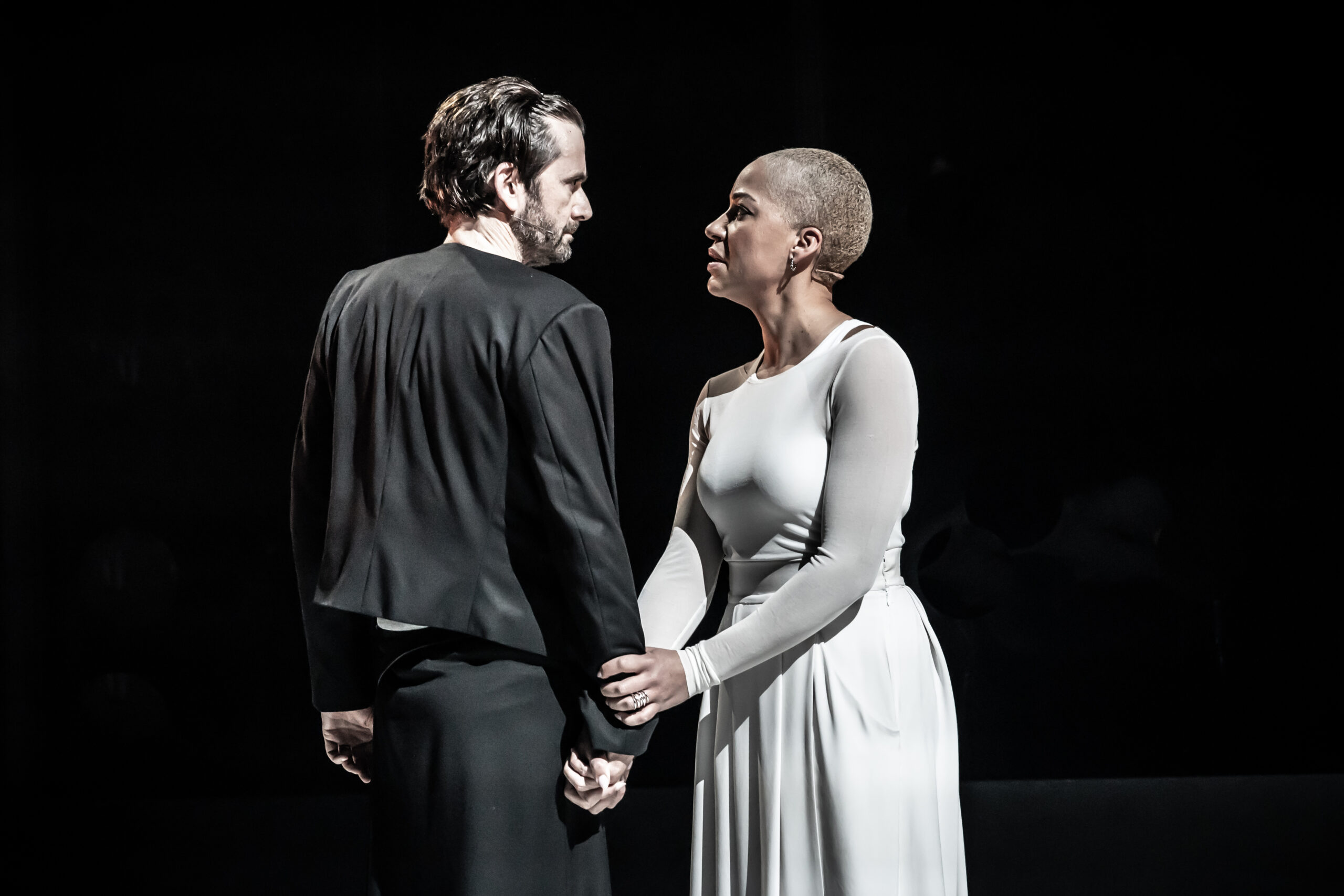
Macbeth’s doubts and ill-feelings disappear quite early on into the play, as he quickly adjusts to his double-life, a character expertly brought to life by David Tennant’s trademark, slightly manic, stubbornly convincing acting-style. His version of Macbeth seems to have been waiting for the push provided by Lady Macbeth to take off his mask of normalcy and don the executioner’s robes. Tennant’s native accent shines in the production, with this being one of his most immersive Shakespeare performances, being strikingly darker and grim, both in tone and performance (compared to say ‘Much Ado About Nothing’ or ‘Hamlet’). Especially in his “tomorrow and tomorrow and tomorrow” monologue, his weary and wavering cadence allows the audience to reflect on the intensity of the despair for Macbeth’s character.
Cush Jumbo impressively holds her own against Tennant. The individuality of her white dress provides a stark contrast against the rest of the cast’s fitted gray and black outfits and kilts. As specified earlier, in my eyes, the white clothing represents a grieving mother while Macbeth, the grief-ridden father becomes vengeful and reckless. The guilt eats away slowly at Lady Macbeth as she sleepwalks and hallucinates about the murder every night, desperately trying to cleanse her hands of the now non-existent traces of blood – “Out, damned spot! Out I say.” In Webster’s ‘Macbeth’, she is an ambitious woman who notices an opportunity and tries to make the most of it, grossly miscalculating what happens next. Her death, though inevitable, comes as a shocking blow to the audience, especially since we are barely able to witness her in the last moments before her suicide attempt.
A stroke of genius by Webster was his decision to not cut out, but rather to adapt, the porter’s speech in Act 2, Scene 3 of the original script. Many productions, including Simon Godwin‘s recent ‘Macbeth’ starring Ralph Fiennes and Indira Varma, deem this speech unnecessary. Webster’s production lets Jatinder Singh Randhawa take the stage to deliver a speech entirely different that written in Shakespeare’s folios, though it achieves a similar effect. The speech is necessary comic relief: though slightly dragged out and eventually repetitive, it replaces an interval and refreshes the concentration of the audience. By including the audience into his comedic spotlight, he cuts the tense subject matter of the play and revives the audience’s stamina.
By the end of the play, as it becomes clear to Macbeth that the prediction about his children never ascending to the throne is about to be proved truthful, he begins to get desperate. In a dramatic turn of events and plot reveal, Macbeth realizes that he is facing his killer and decides to goad him into stabbing him, ever rebellious till the end
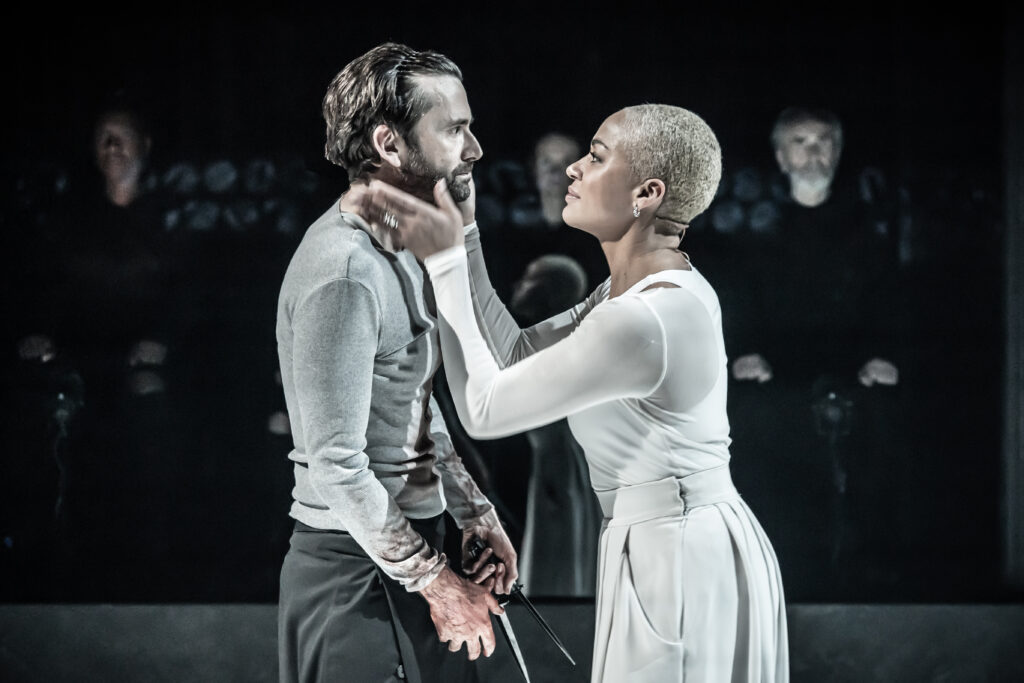
Having lost his wife already and all hopes of his children ascending, Tennant’s Macbeth crushingly, inevitably, concludes the play by giving up his fight for survival and power. David Tennant and Cush Jumbo’s ability to endear themselves to their audience transcends above and beyond the stage, and makes the impression of their inevitable failure felt as an acute loss to the audience. The sheer physicality of the lead actors’ performances lend to the desperation and chill that the audience is bound to feel by this point. The fight scene between Macbeth and Macduff, portrayed quite traditionally, lends a haunting finality to the final blow, as Macbeth is stabbed to death by the vengeful Macduff.
As the play draws to an end and Birnam Wood marches itself up to the very castle, the glass chamber-like part of the stage that, up until then, had housed the musicians, fills up with trees and emits a fog. Silence following Macbeth’s death creeps over the audience like a chill, and I marveled yet again at Gareth Fry’s astounding sound design. The Celtic folk music from the headphones was hauntingly immersive, and lent itself well to the otherworldly and fantastical atmosphere created over the span of two hours. The standing ovation at the end was so inevitable, the wayward sisters could’ve prophesied it!
Getting to watch ‘Macbeth’ at the Harold Pinter Theatre was an overwhelming experience in itself—from getting tickets to the show at 10am on the same morning, to the rush to the theater after a full day of classes, the two hours I spent standing are not hours I’ll be forgetting soon. Not to mention the stage-door appearance of the lead actors after the show to sign programs: I think it’s safe to say that my having to sit down in the middle of Trafalgar Square on the way back home at 11pm to process such an eventful day is perfectly understandable.
‘Macbeth’ is playing at the Harold Pinter Theatre until December 14th, 2024.

